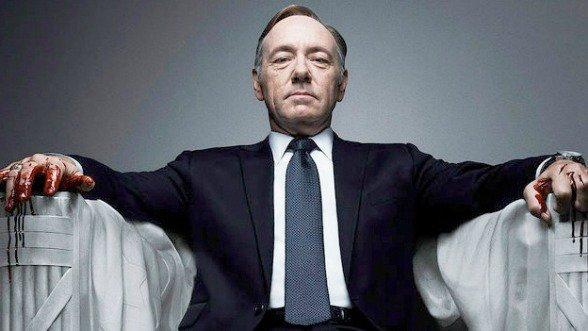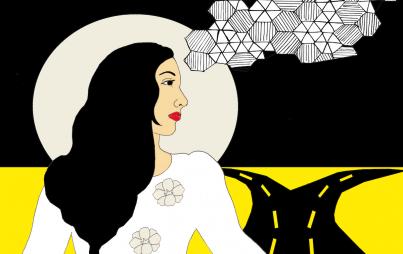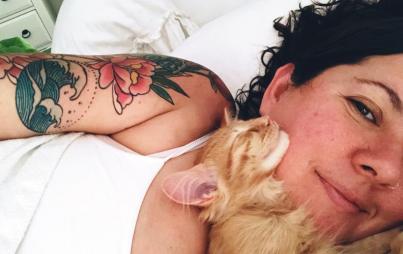
The Netflix hit has become the latest example of bi-erasure at work.
Last month, everybody’s favorite bingewatching service, Netflix, released a new season of House of Cards. However, even though we are now on the third season, everyone is still hung up on the events of the second.
The biggest highlight of season two was not Frank Underwood's ascension to the presidential throne, but the revelation that Frank Underwood’s sexuality is more complicated than anyone ever thought. He subverted expectations when he and his wife engaged in a threesome with his bodyguard Edward Meechum. Prior to this, there was no obvious lead-up or suggestion that Frank was anything other than heterosexual, so it was assumed the showrunners would go for the heteronormative default. Whatever their motivations, Frank has become a rare commodity. There are very few bisexual men on TV, and fewer who are billed as part of the main cast.
(Confession: I have not finished season three yet. I’m still slowly making my way through it, hoping for a few more gifable scenes that do more than hint at Frank’s sexuality. But that hasn’t stopped me from reading recaps, thinkpieces, and interviews about it. The article that caught my attention above all others was the one where the series creator dismissed Frank’s sexuality as ambiguous.)
Beau Willimon claimed in his recent interview with HuffingtonPost that Frank doesn’t really put “much stock in . . . labels” like bisexual or pansexual. He’s reluctant to “pin him down.” Despite the fact that he clearly enjoys sex with men and women, Willimon doesn’t deem this aspect of his identity worthy of exploring or naming. Instead he evades the "b" word by talking about trust and steering the conversation toward a general intimacy that could be found in any relationship. When asked about Frank’s relationship with a different man, he continues to elude clarity: “It’s an emotional connection. Not necessarily a sexual one.” Though this conversation wears the mask of progressiveness, it perpetuates the silence surrounding men’s bisexual representation. You say ambiguous, I say bi-erasure.
|
Sexuality is only ambiguous if you’re taught ‘bisexuality’ is a bad word.
|
The nutshell version of bi-erasure is the dismissing of bisexual identities and devaluing the importance of bisexual representation in culture and society. It’s bi-erasure when Frank is meticulous in all aspects of his life but his sexuality is no big deal. It’s bi-erasure when Hannibal’s creator intentionally puts queer subtext in the series and then laughs off the assertions that Hannibal isn’t straight or deserves a label.
Bi-erasure is the reason why a show like Constantine has gotten so much attention. Constantine in particular has received more media and social media attention for its erasure of the titular character’s bisexuality and subsequent queer-baiting than the actual content. Bisexuals are everywhere—except in film and television.
***
Now, I’m all about individual people having the right to describe their gender and sexuality as whatever they want. Everyone is entitled to their own identity. But the fact that people regularly claim bisexuality doesn’t exist and we need scientific studies to justify our own existence is a problem. Neither heterosexual nor homosexual people are under the same type of pressure to "choose a side" or just be "fluid" and shut up about it.
This is not to downplay systemic homophobia, but it’s important to acknowledge that so many who represent the L and G in LGBT behave in ways that are biphobic and damaging. Bisexual people have the unique experience of having to deal with bi-erasure when people assume we are "straight passing"; homophobia from a heteronormative society; and biphobia from the people who are supposed to represent a safe community for us. The invisibility of bisexuality in the media further enables bi-erasure in the real world.
But bi-erasure goes beyond just denying the audience full and realistic characters. Bi-erasure and biphobia create real social consequences and health risks for men. A study released last year reveals that men are severely stigmatized and feel unsafe in ways that affect their behavior and health. They are perceived to be “disease vectors” carrying STIs, are more likely to drop out of school, more likely to struggle with substance abuse, and experience unsafe sexual behavior and coercion, among other issues. Mental health is also a major concern, with bisexual men experiencing higher rates of depression, anxiety, and self-harming behaviors at a higher rate than gay men due in part to the feelings of isolation created by erasure.
While there’s no one easy way to fix it, allowing bisexuals to exist on TV and showing bisexual viewers that they’re not alone is a start. It’s going to be hard to have a bisexual president in real life if one can’t be accepted onscreen.
It’s safe to say that Frank is most likely either bisexual or pansexual. The difference between the two is a whole other discussion, but I’m claiming Frank for #teambisexual. Sexuality is only ambiguous if you’re taught "bisexuality" is a bad word.
This story first appeared at The Good Men Project. Follow The Good Men Project on Facebook!







